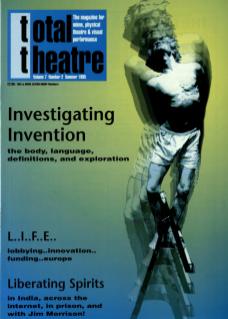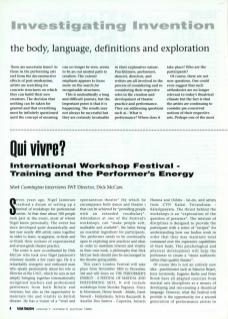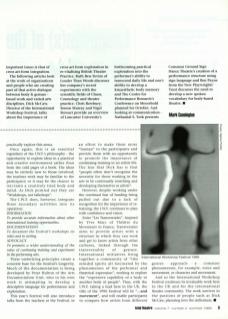Seven years ago, Nigel Jamieson realised a dream of setting up a festival of workshops for professional artists. At that time about 100 people took part in the event, most of whom Nigel knew personally. The event has since developed quite dramatically and last year nearly 400 artists came together in order to learn, reappraise, refresh and rethink their notions of experimental and avant-garde theatre practice.
The event is now coordinated by Dick McCaw, who took over Nigel Jamieson's visionary mantle a few years ago. He is a remarkably energetic and enthused man who speaks passionately about his role as Director of the IWF, which he sees as not simply bringing together internationally recognised teachers and professional performers from both Britain and overseas, but also as the opportunity to maintain life and vitality in British theatre. He has a vision of a ‘vital and spontaneous theatre’ (by which he encompasses both dance and theatre) that can be achieved by ‘providing people with an extended vocabulary’. Attendance at one of the Festival's workshops, can ‘make people soft, malleable and available’, the latter being an essential ingredient for participants. The performer needs to be continually open to exploring new practices and ideas in order to maintain interest and vitality in their own work, a philosophy that Dick McCaw feels should also be encouraged in the theatre-going public.
This year's London Festival will take place from 18 November to 3 December and will focus on The Performer’s Energy – A Festival of Martial and Performing Arts. It will include workshops from Monika Pagneux – Voice & Movement, Henry Smith – Aikido, Garet Newell – Feldenkrais, Sylvia Bazzarelli & Aurelio Dos Santos – Capoeira, Senseis Haruna and Oshita – lal-do, and artists from CVN Kalari Trivandrum Kalarippayatu. The thrust behind the workshops is an ‘exploration of the question of presence’. The mixture of disciplines is designed to provide the participant with a series of ‘recipes’ for understanding how our bodies work in order that they may maintain total command over the expressive capabilities of their body. This psychological and physical development will help the performer to create a ‘more authentic rather than quality theatre’.
Of course this is not an entirely new idea – practitioners such as Maurice Bejart, Jerzy Grotowski, Eugenio Barba and Peter Brook have all adapted exercises from martial arts disciplines as a means of developing and (re)creating a theatrical language. However, what the Festival will provide is the opportunity for a second generation of performance artists to practically explore this arena.
Once again, this is an essential ingredient of the IWF's philosophy – the opportunity to explore ideas in a practical and creative environment rather than from the cold pages of a book. The ideas may be entirely new to those involved; the teachers work may be familiar to the participant; or it may be the chance to (re)train a creatively tired body and mind. As Dick pointed out they are ‘Workshops, not talkshops’.
The IWF does, however, integrate three secondary activities into its operation:
Information – To provide accurate information about other international training opportunities.
Documentation – To document the Festival's workshops on video and in writing.
Advocacy – To promote a wider understanding of the value of continuing training and experimention in the performing arts.
These underlying principles create a concrete base for the festival's longevity. Much of the documentation is being developed by Peter Hulton of the Arts Documentation Unit, who in his own work is attempting to develop a descriptive language for performance and exploration.
This year's Festival will also introduce talks from the teachers at the Festival, in an effort to make them more ‘human’ to the participants and provide them with an opportunity to promote the importance of continuing training in an artist’s life. The fear that Dick has is that ‘people often don't recognise the necessity for those working in the arts to be continually enriching and developing themselves as artists’.
However, despite working under the continual fear of funding being pulled out due to a lack of recognition for the importance of retraining, the IWF continues to plan with confidence and vision.
Enter ‘Les Transversales’. Inspired by Yves Marc of Théâtre du Mouvement in France, Transversales aims to provide artists with a structure in which they can work and get to know artists from other cultures, linked through the transversality of gesture. International initiatives bring together a community of ‘like minded spirits all fascinated by the phenomenon of the performer and theatrical expression’, working to explore the ‘expressive capability of a body to another body of people’. Thus, with the IWF taking a lead here in the UK, the title of the 1996 Festival will be ‘...and movement’, and will enable participants to compare how artists from different genres approach a common phenomenon, for example, voice and movement, or character and movement.
And so the International Workshop Festival continues its invaluable work here in the UK and for the international theatre community. The work survives in the passions of people such as Dick McCaw, planning into the Millennium.


